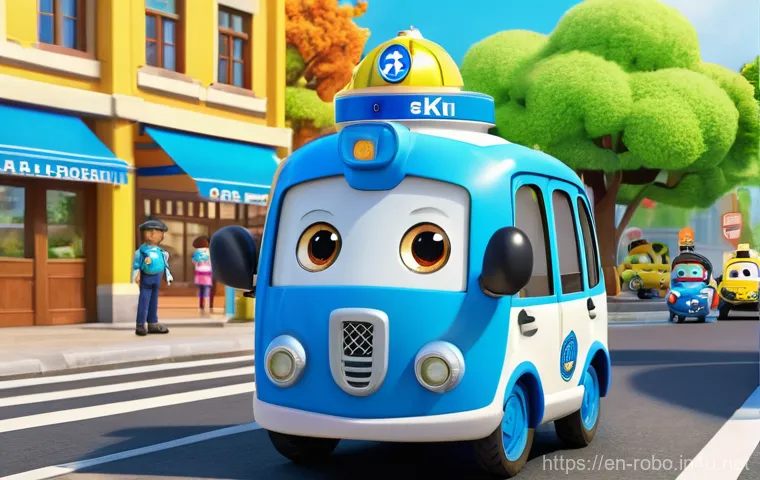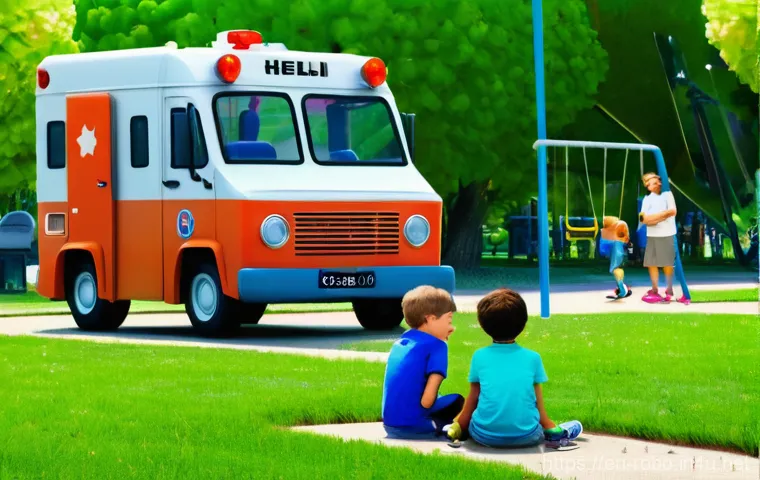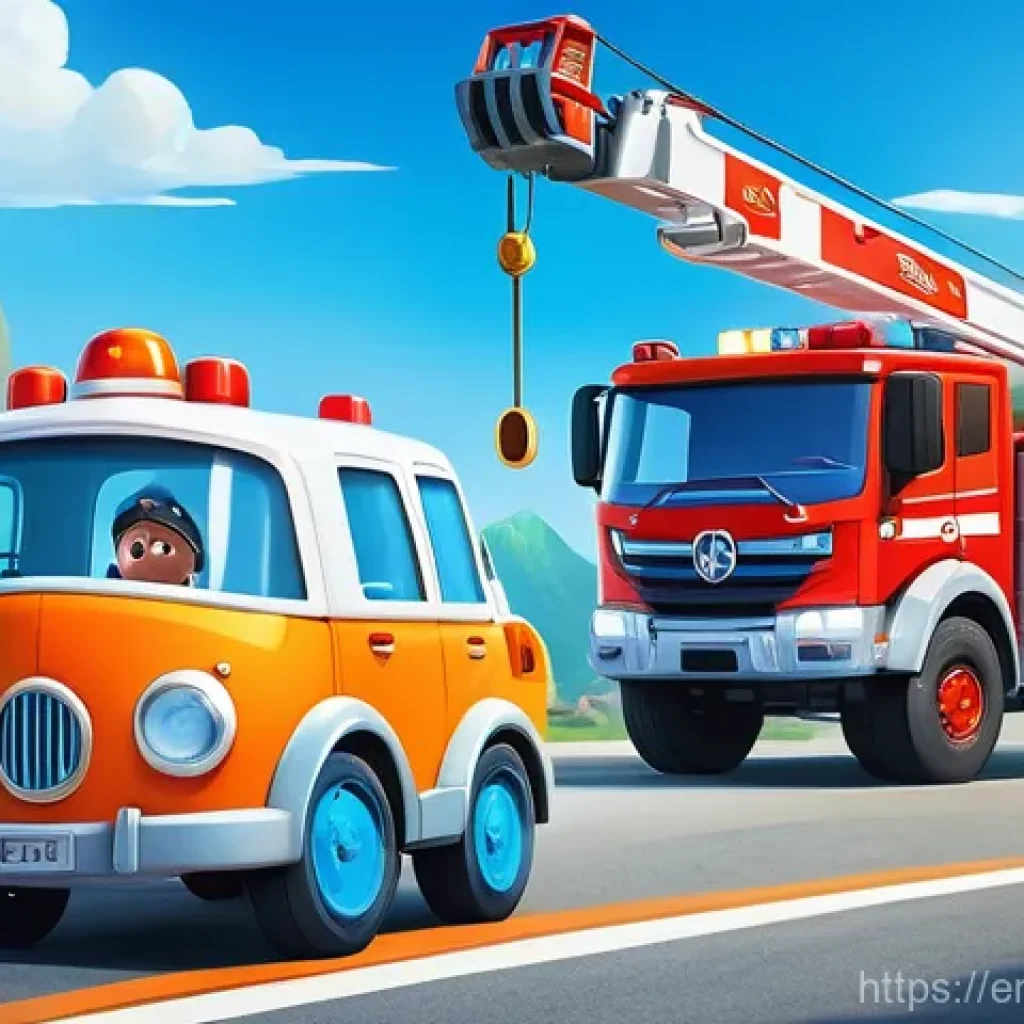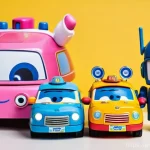When you’re a parent, or really, anyone who spends time with little ones, you quickly realize how much influence kids’ shows have. We’re not just talking about keeping them entertained for a few precious minutes of peace; these shows actually shape their understanding of the world.
I’ve personally seen how a well-crafted children’s program can spark conversations about kindness or reinforce vital life lessons, and let me tell you, it’s a game-changer.
One series that consistently impresses me with its subtle yet powerful educational approach is Robocar Poli. This charming animated rescue team from Brooms Town has been a global phenomenon, winning over hearts in over 144 countries and across 35 languages.
But it’s more than just catchy tunes and transforming vehicles; what truly sets Robocar Poli apart is its brilliant integration of social messages. While many shows focus purely on fun, Poli, Roy, Amber, and Helly go the extra mile, teaching our kids about cooperation, empathy, and crucial safety tips in a way that feels natural and engaging.
I’ve observed firsthand how episodes spark discussions about helping friends, understanding different feelings, or even traffic safety, making it a fantastic tool for nurturing social-emotional learning from a young age.
In an age where media heavily influences child development, Robocar Poli stands out as a beacon of positive influence, promoting healthy social skills and responsible decision-making.
It’s genuinely remarkable how much impact these seemingly simple stories can have on a child’s growth and understanding of their place in the community.
It’s clear that this isn’t just entertainment; it’s a carefully designed educational experience. So, how does this adorable rescue team manage to deliver such profound lessons without ever feeling preachy?
And what can we, as adults, learn from their approach to teaching valuable social competencies? Let’s dive in deeper and find out exactly what makes Robocar Poli such a unique and impactful show for our children.
The Magic Behind the Missions: More Than Just Catchy Tunes

You know, it’s easy for kids’ shows to get lost in the sea of vibrant animations and repetitive songs. But from my own experience, Robocar Poli stands out in a really meaningful way. It’s not just about the cool transforming vehicles or the exciting rescue missions; it’s the quiet, consistent way the show nurtures essential life skills. I’ve personally seen my little ones, after watching an episode, spontaneously offer to help a friend who’s dropped their toys, or articulate why someone might be feeling sad. It truly feels like the creators aren’t just aiming for entertainment, but for genuine growth, wrapping up important lessons in a package that’s absolutely irresistible to young minds. They hit that sweet spot where children are completely engrossed, and at the same time, absorbing vital social cues and problem-solving strategies without even realizing they’re learning. This isn’t just passive viewing; it’s active engagement that sparks real-life application, and as a parent, that’s incredibly rewarding to witness.
Unpacking the Emotional Toolbelt
One of the things I consistently marvel at with Robocar Poli is its gentle yet powerful approach to emotional intelligence. It doesn’t shy away from showing characters experiencing a range of feelings – frustration, sadness, fear, joy – and, crucially, demonstrates healthy ways to process them. My kids, for instance, were watching an episode where a character felt left out, and it sparked a whole conversation in our living room about how we can make sure everyone feels included. It’s this kind of authentic portrayal of emotions and their resolution that truly helps children develop their own emotional toolbelt. They learn to identify feelings, understand their impact on others, and practice empathy, all through the engaging narratives of Brooms Town. It’s a subtle but incredibly effective way to build a foundation for strong social skills, and frankly, I wish more shows would take this nuanced approach.
The Unsung Heroes of Cooperation
I’ve always believed that teaching kids the value of teamwork is paramount, and Robocar Poli nails this every single time. Every single rescue mission, whether it’s retrieving a lost pet or fixing a broken bridge, requires the entire team – Poli, Roy, Amber, and Helly – to work together, leveraging their unique skills. I love how the show visually reinforces that everyone has a role to play and that combining efforts leads to the best outcomes. There’s no single hero; it’s always a collective triumph. Watching these episodes has undoubtedly made an impact on my children’s playtime. I’ve noticed them delegating tasks during their make-believe games, saying things like, “Okay, you be Amber and help fix it, and I’ll be Poli and guide them!” It’s a fantastic real-world application of what they’re seeing on screen, and it genuinely warms my heart to see them embrace cooperation so naturally.
Safety First, Always: Lessons That Stick
When it comes to teaching kids about safety, it can often feel like a constant uphill battle. You repeat the same advice over and over, hoping something sticks. But with Robocar Poli, it’s different. They’ve managed to integrate critical safety lessons into engaging storylines in a way that truly resonates with children. I’ve personally experienced moments where my child, having just watched an episode about road safety, will instinctively look both ways before crossing even a quiet street, or remind me about wearing a helmet. It’s not preachy; it’s simply part of the narrative, making it feel less like a lecture and more like an exciting adventure where being safe is just a natural part of being a good citizen. This approach is invaluable because it empowers kids with knowledge that can genuinely protect them, fostering a sense of responsibility for their own well-being and the safety of those around them. It’s truly a masterclass in educational programming.
Navigating the World Safely: From Roads to Playgrounds
One of the standout features for me is how Robocar Poli tackles various aspects of safety, making it relevant to everyday situations. They cover everything from basic traffic rules like “stop, look, and listen” to fire safety, understanding stranger danger, and even the importance of not playing near construction sites. Each episode presents a common scenario where a character might face a safety hazard, and then the rescue team steps in to not only resolve the situation but also gently educate the character and the audience on how to prevent similar incidents in the future. I recall an episode where a small car ignored a traffic light, leading to a near-miss, and the subsequent explanation from Poli about why traffic rules exist was just perfect. It provides children with practical, actionable information in a digestible format, ensuring that these vital lessons aren’t just heard, but truly understood and internalized. It’s remarkable how comprehensive their safety curriculum is without ever feeling overwhelming.
The Power of “Ask for Help”
Beyond specific safety rules, Robocar Poli consistently emphasizes the importance of asking for help when in trouble. This is a life skill that I believe is often overlooked, but it’s absolutely crucial for children’s safety and well-being. The show repeatedly demonstrates that it’s brave, not weak, to seek assistance from trusted adults or the rescue team when facing a difficult or dangerous situation. I’ve seen my own children, after watching an episode, become more vocal about needing help with something, whether it’s reaching a high shelf or expressing confusion about a task. It builds a sense of trust and reassurance, letting them know that there are always people willing and able to lend a hand. This message is incredibly empowering, teaching kids that they don’t have to face challenges alone and that seeking support is a sign of intelligence and self-awareness.
Beyond Entertainment: Cultivating Kindness and Community
What truly sets Robocar Poli apart, in my humble opinion, is its unwavering focus on nurturing a sense of community and kindness. It’s not just about flashy rescues; it’s about the underlying ethos of caring for one another that permeates every single episode. I’ve observed firsthand how these stories subtly instill values of empathy, generosity, and respect. My children often mimic the polite and helpful interactions of the characters, leading to more harmonious playdates and a greater understanding of what it means to be a good friend. It’s an almost effortless way to teach foundational social graces and the importance of looking out for your neighbors, whether they’re human or a talking car. This commitment to fostering positive social interactions is a huge win for parents and educators alike, making the show a fantastic resource for building compassionate, well-adjusted little humans who genuinely care about the world around them.
Empathy in Action: Walking in Another’s Wheels
The show does a remarkable job of illustrating empathy in a way that young children can easily grasp. Often, an issue arises because a character hasn’t considered the feelings or perspective of another. The Robocar Poli team doesn’t just fix the problem; they help the characters understand *why* the situation became difficult, often by encouraging them to imagine how others might feel. For instance, if a character accidentally causes a mess, the show takes the time to show the impact on others and the importance of making amends. I’ve seen this resonate deeply with my own kids. They’ll often say, “How would *you* feel if that happened?” which is a direct reflection of the empathetic reasoning they pick up from the show. It’s a powerful lesson in emotional intelligence, teaching them to consider the broader impact of their actions and to approach situations with kindness and understanding. It’s truly heartwarming to witness this development.
Building Strong Social Bonds
Another fantastic aspect of Robocar Poli is its consistent portrayal of strong, healthy friendships and community bonds. The residents of Brooms Town always come together to support each other, whether it’s celebrating a success or helping someone through a tough time. There’s a beautiful sense of interdependence, where everyone contributes to the well-being of the collective. I’ve noticed how my children, after watching these episodes, become more proactive in their own social circles. They’ll invite friends to play, share their toys more readily, and even try to mediate small disagreements, echoing the collaborative spirit of Poli and the team. It teaches them that being part of a community means both giving and receiving support, fostering a sense of belonging and responsibility that is crucial for healthy social development. It’s not just about “rescuing” but about building and maintaining a thriving, supportive environment for everyone.
The Genius of Subtle Storytelling: Lessons Without Lectures
As a parent, I’m constantly on the lookout for educational content that doesn’t feel like, well, *education*. We’ve all been there: a show starts to feel preachy, and suddenly the kids’ eyes glaze over. But Robocar Poli? It’s a masterclass in subtle storytelling. They manage to weave in complex social and safety lessons so seamlessly that my children are just enjoying the adventure, completely oblivious to the fact that they’re absorbing crucial information. It’s like magic, truly. The narratives are engaging, the characters are lovable, and the moral of the story is always integrated so naturally that it feels like an organic part of the plot rather than a forced lesson. This approach keeps children captivated, ensuring a higher retention rate for the valuable messages embedded within each episode. I’ve seen this strategy work wonders, creating a positive learning environment without any of the typical resistance that can come with explicit instruction.
Engaging Narratives for Young Minds
The brilliance of Robocar Poli lies in its ability to craft engaging narratives that speak directly to the experiences and understanding of young children. Each episode presents a relatable problem or challenge, often one that my kids have encountered or could easily imagine. Whether it’s a lost toy, a minor accident, or a misunderstanding between friends, the scenarios are always grounded in a child’s world. This relatability is key to keeping them invested in the story and, by extension, invested in the solution. For example, an episode about littering might show a small animal’s habitat being affected, making the environmental message tangible and personal for a child. It’s this thoughtful construction of stories that turns abstract concepts into concrete, understandable lessons, fostering a deeper connection with the content and encouraging active thought rather than passive viewing. They really know how to tell a story that sticks.
The Power of Repetition (Without Being Repetitive)

You know, one of the challenges in children’s programming is finding that sweet spot with repetition. Too much, and kids get bored; too little, and the message doesn’t sink in. Robocar Poli absolutely nails this. While the core themes of safety, cooperation, and kindness are present in every episode, they’re always presented through fresh, unique scenarios. This means the underlying messages are constantly reinforced, but the stories themselves feel new and exciting. My kids never feel like they’re watching the same episode twice, even though the fundamental principles being taught are consistent. This clever approach to repetition is incredibly effective for young learners, allowing them to internalize important concepts over time without ever feeling lectured or bored. It’s a testament to the show’s creative team and their deep understanding of child development and engagement.
Robocar Poli’s Global Impact: A Universal Language of Goodness
It’s truly incredible to think about how a show born in South Korea has managed to capture the hearts and minds of children in over 144 countries, translated into 35 languages. From my perspective, this global appeal isn’t just a testament to its catchy animation or exciting rescue plots; it speaks volumes about the universal values it champions. Regardless of cultural background, parents everywhere want their children to be kind, safe, and cooperative. Robocar Poli manages to distill these fundamental human aspirations into stories that transcend language barriers. I’ve heard from fellow parents in different parts of the world, and the sentiment is always the same: the show helps their children understand compassion and responsibility. It’s a wonderful reminder that at our core, we all share similar hopes for the next generation, and a well-crafted children’s program can be a powerful tool in fostering those shared ideals. It truly feels like a global ambassador for positive child development.
Bridging Cultural Divides Through Shared Values
What I find particularly fascinating about Robocar Poli’s global success is its ability to bridge cultural divides. While specific customs might vary, the core lessons of helping friends, understanding emotions, and practicing safety are universally applicable. The show’s focus on the collective good of Brooms Town resonates in any community, promoting a sense of shared responsibility and mutual respect. I believe this is a major factor in its widespread acceptance. It doesn’t rely on culturally specific humor or references that might get lost in translation; instead, it taps into the fundamental human experiences of childhood – curiosity, friendship, learning, and overcoming challenges. This universal approach ensures that its powerful messages of empathy and teamwork are understood and appreciated by children and parents regardless of where they live. It’s a beautiful example of how media can unite us.
The Secret to Its Enduring Popularity
Many children’s shows come and go, but Robocar Poli has truly endured. From my observations and conversations with other parents, its longevity stems from a few key factors. First, the consistent quality of its storytelling and animation is top-notch, always engaging young viewers. Second, and perhaps most importantly, is its unwavering commitment to positive educational content without sacrificing entertainment value. Children love the transforming vehicles and exciting rescues, while parents appreciate the valuable lessons being taught. This dual appeal ensures that both demographics are satisfied, leading to repeat viewings and strong word-of-mouth recommendations. Finally, the show’s focus on timeless virtues like kindness, bravery, and community ensures that its messages remain relevant across generations. It’s not a show that chases trends; it sets a standard for meaningful children’s entertainment that truly lasts.
Practical Takeaways for Parents and Educators
As a parent, and someone who’s constantly thinking about how media impacts our kids, I’ve really reflected on what makes Robocar Poli so effective. It’s not just about letting your kids watch it; it’s about understanding the genius behind its design and even leveraging it in your daily life. I’ve personally found that the show provides an incredible springboard for conversations about real-world scenarios. For example, if an episode features a character feeling frustrated, I might pause it and ask my child, “How do you think [character’s name] is feeling? What could they do?” This simple act turns passive viewing into an active learning experience, reinforcing the lessons in a way that truly sticks. It’s about taking those on-screen moments and connecting them to your child’s own experiences, making the abstract concept of empathy or safety tangible and personal. It’s truly a valuable resource if you approach it with intention.
Extending the Lessons Beyond the Screen
One of the most valuable things I’ve learned from watching Robocar Poli with my kids is how easily its lessons can be extended into real life. It’s not just a show you watch and forget; it’s a living curriculum. After an episode about sharing, for example, I might say, “Remember how Poli helped his friends share their toys? How can we do that when we play with our friends?” This kind of guided reflection helps children apply the show’s teachings to their own behavior. We often use the characters as examples when discussing social situations or safety rules. If my child is hesitant to wear a helmet, I might remind them, “Even Helly wears a helmet to be safe, right?” These small, consistent reminders rooted in characters they admire make a huge difference in reinforcing positive behaviors. It’s about making the learning continuous and integrated into their everyday lives, which is far more effective than isolated lessons.
Table: Key Values Promoted by Robocar Poli
| Value | Example from Show | Real-World Application for Kids |
|---|---|---|
| Cooperation | The entire rescue team works together to solve problems, each using their unique skills. | Playing collaboratively with friends, helping with chores, sharing toys. |
| Empathy | Characters learn to understand and share the feelings of others, offering comfort and support. | Comforting a sad friend, understanding different perspectives, being kind to others. |
| Safety Awareness | Episodes directly address road safety, fire safety, and the importance of asking for help. | Looking both ways before crossing the street, wearing a helmet, telling a trusted adult when something feels unsafe. |
| Problem-Solving | The team brainstorms and implements solutions to various challenges in Brooms Town. | Figuring out how to build a tall tower, resolving conflicts with siblings, finding solutions to small dilemmas. |
| Responsibility | Characters learn to take accountability for their actions and help maintain their community. | Cleaning up toys, apologizing when necessary, taking care of pets or plants. |
Fostering Critical Thinking Through Discussion
Beyond simply absorbing the lessons, Robocar Poli can be a fantastic tool for fostering critical thinking skills in young children. I often use episodes as a jumping-off point for discussions, asking open-ended questions like, “What do you think will happen next?” or “What else could the team have done?” This encourages my children to think actively about the plot and the characters’ decisions, rather than just passively observing. It helps them develop their own problem-solving abilities and understand cause and effect. For instance, after an episode where a character learned a hard lesson from not following rules, we might discuss why rules are important and what the consequences could have been. This type of interactive viewing transforms screen time into a dynamic educational experience, building not just knowledge, but also the crucial ability to analyze, question, and form their own reasoned conclusions. It’s a game-changer for cognitive development.
Wrapping Things Up
So, as you can probably tell by now, Robocar Poli is more than just another animated series playing in the background. From my personal journey with it, I genuinely believe it’s a carefully crafted tool for nurturing little minds and hearts. It’s truly amazing how a show can blend high-octane rescues with profound life lessons, all while keeping kids completely enthralled. It’s been an absolute staple in our home, providing countless moments of joy, learning, and those precious “aha!” moments that every parent cherishes.
Handy Tips for Parents
Here are a few nuggets of wisdom I’ve picked up from integrating shows like Robocar Poli into our family life:
1. Watch with your kids occasionally! You’d be surprised how much more engaging and educational it becomes when you can discuss what’s happening on screen in real-time. It turns passive viewing into active learning, making those valuable lessons truly stick.
2. Use character examples in daily conversations. If your child is struggling with sharing, you can gently remind them, “Remember how Poli shared his tools to help Roy? What could we do here?” This makes abstract concepts relatable.
3. Encourage role-playing based on the show. Kids often mimic what they see, and having them act out rescue missions or cooperative tasks helps solidify the importance of teamwork and problem-solving in a fun, interactive way.
4. Discuss emotions. Robocar Poli is fantastic at portraying a range of feelings. Use these moments to ask your child how a character might be feeling and what they could do to help, building their emotional intelligence.
5. Don’t be afraid to pause and explain. If a safety message comes up, briefly hitting pause to elaborate on why it’s important can make a huge difference in their understanding and real-world application of the lesson. It’s all about making the most of screen time!
Key Takeaways
Ultimately, Robocar Poli stands as a shining example of children’s entertainment done right. It brilliantly combines thrilling adventures with essential life lessons, fostering empathy, cooperation, and safety awareness in young viewers. Parents gain a valuable ally in teaching crucial social and emotional skills, all wrapped up in an engaging, globally loved package. It’s truly a show that gives back, empowering our little ones to become thoughtful, responsible, and kind individuals.
Frequently Asked Questions (FAQ) 📖
Q: How does Robocar Poli manage to teach complex social lessons without feeling like a lecture to kids?
A: That’s a fantastic question, and honestly, it’s what impressed me most when I first started watching it with my little one! What I’ve personally seen is that Robocar Poli excels because it wraps all those important lessons in genuinely engaging storylines.
Instead of just telling kids, “be kind,” an episode will show Poli and his friends facing a real problem in Brooms Town – maybe someone’s stuck, or there’s a misunderstanding.
Through their actions, the characters demonstrate problem-solving, teamwork, and empathy. The core is always a relatable situation for kids, where a social or safety issue naturally arises.
Then, Poli and the team work together, often making small mistakes or learning along the way, which makes it feel incredibly authentic. It’s not about being perfect, it’s about trying, helping, and learning.
I’ve noticed my child picking up on these cues – they see the consequences of certain actions and the positive outcomes of cooperation, all without ever feeling like they’re being “taught” in a traditional sense.
It’s pure, unadulterated storytelling with a powerful, positive message woven right into its fabric.
Q: What are some of the key life skills and safety lessons my child can truly grasp from watching Robocar Poli?
A: Oh, you’d be surprised by the breadth of lessons packed into this charming show! From my perspective as a parent, I’ve seen it foster everything from basic road safety to some pretty profound emotional intelligence.
For instance, the safety episodes are brilliant – they cover things like “don’t run into the street,” “always wear a helmet,” or “look both ways,” but they present it in a memorable, story-driven way where a character might face a minor consequence for not following the rule, and then the rescue team helps them understand why that rule exists.
It’s not fear-mongering; it’s practical education. Beyond that, the show is a masterclass in social-emotional learning. I’ve seen episodes beautifully tackle themes like understanding different emotions (anger, sadness, fear), learning to share, resolving conflicts peacefully, and the importance of saying “I’m sorry” and forgiving others.
My own kiddo once pointed out “Helly is feeling shy!” after watching an episode, which showed me how much they were internalizing the emotional cues. It’s truly amazing how these transforming vehicles help teach our children how to navigate the world safely and kindly.
Q: With so many children’s shows out there, what makes Robocar Poli stand out and resonate with kids and parents globally?
A: That’s the million-dollar question, isn’t it? In my experience, Robocar Poli has this magical blend that just works on multiple levels. First off, the characters are incredibly appealing.
Poli, Roy, Amber, and Helly are distinct, lovable, and kids quickly find their favorites. The transforming vehicle aspect is, of course, a huge draw – who doesn’t love a car that turns into a robot?
But what I truly believe gives it staying power is its universal message of cooperation and helping others. These aren’t just local Brooms Town problems; they’re situations that kids and parents everywhere can relate to.
The show consistently promotes positive values without being preachy or overly simplistic. It shows real-world challenges in a child-friendly way and consistently provides positive resolutions, which is incredibly reassuring for parents.
Plus, the animation is bright and engaging, the music is catchy, and the pacing is just right to keep little minds focused. It’s that rare show that manages to entertain, educate, and genuinely uplift, making it a win-win for both kids and the adults watching alongside them.
It’s built on solid, wholesome principles, and that resonates deeply, no matter where you are in the world.






